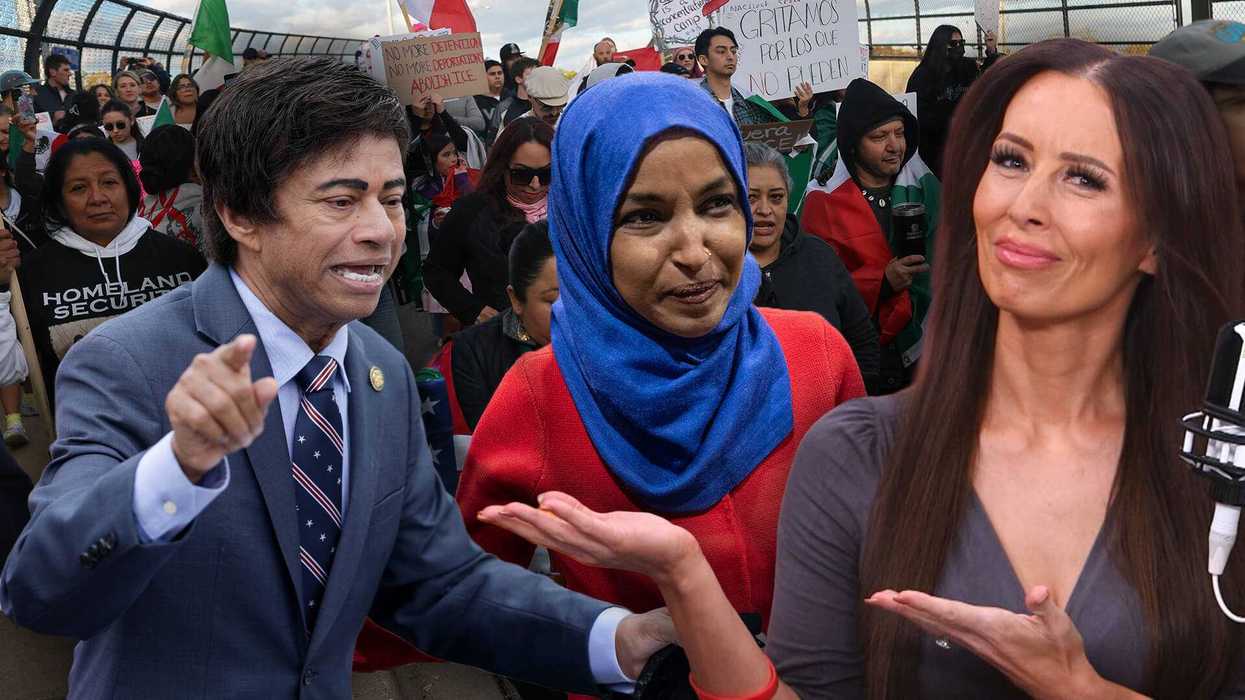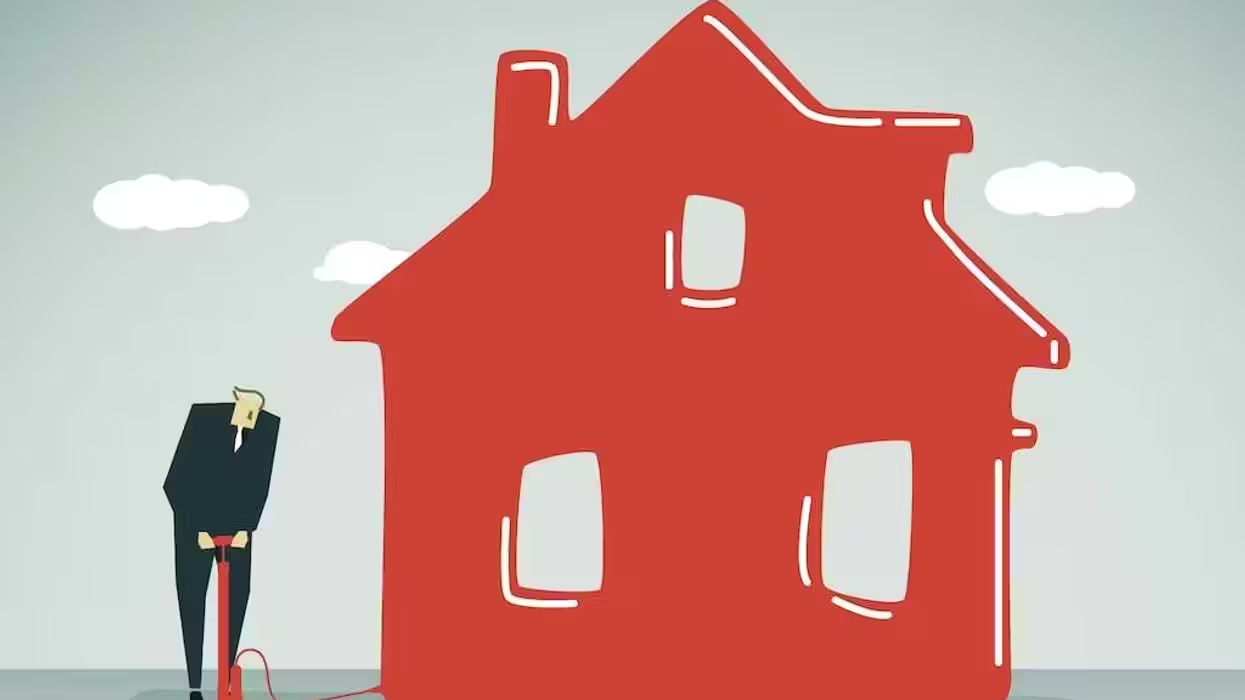
© 2026 Blaze Media LLC. All rights reserved.
"We have to live within our means..."
Editor's note: this story originally contained live video of the president's speech. It has been replaced by a relevant story.
WASHINGTON (AP) -- Forcefully rejecting Republican budget-cutting plans, President Barack Obama on Wednesday proposed lowering the nation's future deficits by $4 trillion over a dozen years and vowed he would not allow benefit cuts for the poor and the elderly to pay for tax breaks for the rich.
"That's not right and it's not going to happen as long as I'm president," Obama declared.
While the president recommended trimming health care costs in Medicare and Medicaid, he also called for cuts in defense, an overhaul of the tax system to eliminate many loopholes enjoyed by individuals and corporations, and an end to Bush-era tax cuts for wealthier Americans.
"We have to live within our means, we have to reduce our deficit, and we have to get back on a path that will allow us to pay down our debt," Obama said in a combative speech at George Washington University.
As much a policy speech as it was a political address, Obama laid the blame for the rising debt on the spending increases and tax cuts enacted during the presidency of George W. Bush and the recession that struck in late 2007. "We lost our way," he said.
Ensuring that the nation's fiscal troubles will be at the center of the 2012 presidential election, Obama drew sharp contrasts with a Republican plan that cuts about $5.8 trillion in spending over the next decade and which the White House says unfairly singles out middle-class taxpayers, older adults and the poor. He pointedly noted that the GOP plan has already been embraced by some Republican presidential candidates.
Such cuts, he said, "paint a vision of our future that's deeply pessimistic."
"Their vision is less about reducing the deficit than it is about changing the basic social compact in America," Obama said, as the author of the Republican plan, House Budget Committee Chairman Paul Ryan, sat in the front row of the university auditorium.
Obama previewed his proposals to congressional leaders Wednesday morning. And even before he delivered his speech, top Republicans were pushing back.
"If we're going to resolve our differences and do something meaningful, raising taxes will not be part of that," House Speaker John Boehner declared shortly after his White House meeting.
This new clash comes just a week after the president announced he would seek re-election. For the past two months, Obama has been arguing for protection of his core spending priorities, including education and innovation. His turn to deficit reduction reflects the pressures he faces in a divided Congress and with a public increasingly anxious about the nation's debt, now exceeding $14 trillion.
"Any serious plan to tackle our deficit will require us to put everything on the table, and take on excess spending wherever it exists in the budget," the president said.
To help enforce budget discipline, the president called for resurrecting a spending cap that would be triggered if the nation's debt did not stabilize and begin to decline by 2014. The cap would not apply to Social Security, low-income programs or Medicare benefits.
The president's plan, outlined in a seven-page White House fact sheet, draws many of its ideas from the December recommendations of Obama's bipartisan fiscal commission, which proposed $4 trillion in deficit reduction over 10 years. As in the commission's plan, three quarters of the deficit reduction would come from spending cuts, including lower interest payments as the debt eases. One quarter, or $1 trillion, would come from additional tax revenue.
For the White House, the speech comes as Obama pushes Congress to raise the limit on the national debt, which will permit the government to borrow more and thus meet its financial obligations. The country will reach its debt limit of $14.3 trillion by May 16. The Treasury Department has warned that failure to raise the limit by midsummer would drive up the cost of borrowing and destroy the economic recovery.
In laying out his plan, the president is wading into a potential political thicket. Liberals are loath to making cuts in prized Democratic programs like Medicare and Medicaid, and in Social Security. Moderates worry that his plan could unravel bipartisan deficit-cutting negotiations. And Republicans reject any proposal that includes tax increases.
The proposal calls for cutting $770 billion from non-defense domestic spending by 2023. That figure does not include spending on major benefit programs like Medicare, Medicaid and Social Security. The plan also would reduce defense spending by $400 billion during the same 12 years.
Obama envisions spending cuts in Medicare and Medicaid of $480 billion through 2023. Those are in addition to the $500 billion in reductions over 10 years from projected increases in Medicare spending contained in the health care law Congress passed and Obama signed last year.
The president's planned health care reductions include vague proposals to lower Medicaid costs and reduce Medicare prescription drug expenses.
While the White House concedes that Social Security is facing pressure from an aging population, Obama did not specify any changes to the national retirement system other than calling for bipartisan efforts to "strengthen the program."
Want to leave a tip?
We answer to you. Help keep our content free of advertisers and big tech censorship by leaving a tip today.
Want to join the conversation?
Already a subscriber?
Jonathon M. Seidl is a former managing editor of Blaze News and a best-selling author and speaker. His next book, “Confessions of a Christian Alcoholic,” will be released on October 7, 2025.
Jonathon M. Seidl
Jonathon M. Seidl is a former managing editor of Blaze News and a best-selling author and speaker. His next book, “Confessions of a Christian Alcoholic,” will be released on October 7, 2025.
more stories
Sign up for the Blaze newsletter
By signing up, you agree to our Privacy Policy and Terms of Use, and agree to receive content that may sometimes include advertisements. You may opt out at any time.
Related Content
© 2026 Blaze Media LLC. All rights reserved.
Get the stories that matter most delivered directly to your inbox.
By signing up, you agree to our Privacy Policy and Terms of Use, and agree to receive content that may sometimes include advertisements. You may opt out at any time.






